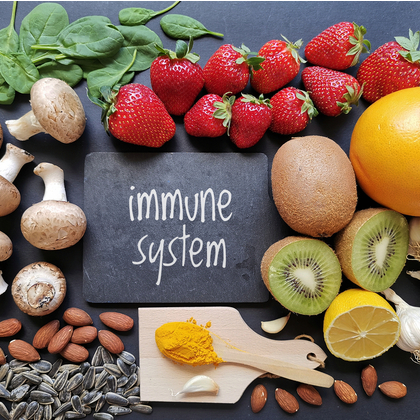
Gut health is a hot topic these days, with an increasing number of researchers investigating how it can influence our health, including our immune systems. So you’ve probably already read or heard about the gut microbiota. But what is it exactly, how does it work with the immune system and are there ways of making it more effective?
The gut microbiota is the name for the community of micro-organisms (or microbes) that lives in the human gastrointestinal tract. There are approximately 100 trillion of these micro-organisms – which far outnumber the cells in a human body – including bacteria, viruses, fungi and parasites (i).
There are a few alternative terms for gut microbiota: gut flora or microflora, for instance, plus intestinal flora or gut bacteria. You may also have heard of the microbiome, though this refers to the collective genomes – complete sets of DNA including genes – of the micro-organisms in the gut.
Of these 100 trillion micro-organisms, most are bacteria. In fact, there are about 1,000 different species of bacteria in the microbiota, represented by around 5,000 different bacterial strains (ii).
So it’s probably no surprise that everybody’s microbiota is unique, with factors like your age, genes, diet, environment, health problems, exposure to stress and any medications you may be taking also affecting its composition. The microbiota has several important jobs, including metabolising nutrients from food and some medicines. It produces vitamin K too, which is important for blood clotting.
But that’s not all. It’s thought that the microbiota has many other roles to play, and scientists are discovering more and more about its importance for human health, including how other organs are influenced by the gut environment and how the microbiota may even help prevent and treat some diseases.
Indeed we’re just starting to discover how having a healthy or unhealthy gut can affect our wellbeing, including how the microbiota regulates human body homeostasis – that is, the state of stability, balance or equilibrium within the body that’s essential for life.
Does Gut Health Affect Your Immune System?
With up to 80 per cent of the body’s immune cells found in the gut (iii), scientists believe the human immune system has evolved alongside the microbiota to protect against disease-causing germs (pathogens), and that each supports and co-operates with the other (iv).
This co-operation – or ‘conversation’ – between the immune system and the microbiota is thought to start the moment we’re born, when our bodies are first introduced to microbes. Then as we grow, our microbiota affects how our immune systems develop, while at the same time our immune systems affect the composition of our microbiota (v).
This process continues for the rest of our lives, with the immune system helping to maintain a stable microbiota and the growth of beneficial micro-organisms and the microbiota producing molecules to support the development of immune cells and improving how the immune system responds to invading pathogens (vi).
In other words, the relationship between the immune system and microbiota helps protect us against things like bacterial and viral infections. But it also helps the gut to tolerate harmless micro-organisms and even encourages our immune system to not attack healthy tissues in the body (when the immune system behaves this way it’s known as autoimmunity, with rheumatoid arthritis and psoriasis two examples of autoimmune disease).
The Intestinal Barrier
The gastrointestinal tract is lined with a layer of tightly packed cells called epithelial cells that produce mucus. So if a pathogen has managed to get past the immune system’s first line of defence – including the skin, mucous membranes and stomach acids – and as far as the gut, it must then penetrate this sticky lining before it can go any further and cause an infection.
The epithelial cells along with some immune cells also produce a chemical barrier by releasing antibodies, inflammatory molecules called cytokines and other antimicrobial substances, all of which try to stop the progress of invading pathogens.
Certain immune cells also help to maintain the intestinal barrier, including M cells (microfold cells), dendritic cells, and B and T cells that live in the intestinal wall. You can find out more about the cells and organs of the immune system by reading Understanding how the immune system works.
Diet and Gut Bacteria
Your gut microbiota helps your body digest much of the food you eat, and at the same time gets most of the nutrients it needs itself from your diet. In fact, scientists believe diet has a major impact on the composition of your gut microbiota, and consequently your immune system (vii).
Many nutrition experts suggest having a lot of variety in your diet is a good way of keeping your gastrointestinal microbiota healthy, and that a lack of microbiota diversity could lead to health problems and disease (viii). So one way to support your gut flora may be to eat at least five portions of different fruits and vegetables every day (the more portions and the more variety the better).
Fruits and vegetables are ideal sources of nutrients for your microbiota because they’re high in fibre. Your body may not be able to digest fibre, but many of the organisms in your microbiota love it, feeding on it and breaking it down. Beans, legumes and whole grains are gut-friendly foods, as they too contain high amounts of fibre.
Foods that help promote the growth of beneficial bacteria in your microbiota are also often called prebiotic foods. These contain different dietary fibres such as inulin, fructo-oligosaccharides (FOS) and beta glucans:
-
Inulin is found in foods such as Jerusalem artichokes, asparagus, leeks, onions and bananas, and is classed as a fructan compound. Indeed scientists believe there’s evidence that fructans have immunomodulatory properties (ix).
-
Also a fructan compound, FOS is made up of short fructose chains and has a naturally subtle sweet taste. There are several theories as to how FOS may affect the immune cells found in the gut – for instance they could activate certain immune cells and help improve the quality of the immune barrier, as well as help reduce intestinal inflammation. Studies meanwhile suggest FOS and other prebiotics may help boost immunity against viral infections such as the flu (x). Researchers elsewhere have found a nutritional supplement containing FOS may increase the number of immune system antibodies in people aged 65 and older (xi). There’s also evidence that FOS may help relieve the symptoms of diarrhoea in children (xii).
-
Beta glucans are compounds found in baker’s yeast, grains such as oats, barley rye and wheat, as well as some mushrooms (eg shiitake) and seaweed. Increasingly thought to be important for immune health, beta glucans have been studied since the 1960. Researchers have found they may have various effects on the human immune system (xiii), and that they may trigger and enhance the function of some immune cells (xiv).
Beta glucans may even help reduce the symptoms of common cold infections, with experts investigating firefighters finding those taking beta glucans had 23 per cent fewer colds than others taking a placebo (xv).
Fermented Foods
You may also be able to top up your microbiota with foods that contain beneficial living micro-organisms or live bacteria (these are often called probiotics, or ‘good’ or ‘friendly’ bacteria).
Some types of live bacteria have been found to help boost the immune system and reduce the risk of viral infections, with studies suggesting they may help prevent and relieve symptoms of colds and other infections (xvi). Another study suggests taking certain types of live bacteria may shorten the length of a cold by almost two days as well as reduce the severity of symptoms (xvii).
These beneficial live bacteria come in many strains, and have names such as Lactobacillus acidophilus, Lactobacillus paracasei, Bifidobacterium longum and Streptococcus thermophilus. One particularly good source of live bacteria is fermented foods. That’s because during the process of fermentation, bacteria and yeasts convert carbohydrates such as starch and sugar into alcohol or acids. This gives fermented foods their distinctive, tangy taste, while promoting the growth of beneficial bacteria.
Examples of fermented foods include:
-
Live natural yoghurt
-
Sauerkraut
-
Tempeh
-
Kefir
-
Kombucha
-
Kimchi
-
Pickles
-
Apple cider vinegar
Supplements containing live bacteria are also available, such as acidophilus capsules (look for a high-strength supplement with billions rather than millions of live bacteria per dose).
Meanwhile being physically active may help boost your gut microbiota too. In one study, for instance, exercise – especially when combined with a protein-rich diet – was found to boost the amount and number of different types of gut bacteria (x).
Find out more about how exercise can help support your immune system by reading How can you strengthen your immune system?
Natural Support For Immunity
Besides keeping your gut microbiota healthy and balanced there are other things you can do to support your immune system, such as using nutritional and herbal supplements. Some that may be helpful include:
Echinacea
A popular medicinal herb, echinacea is used to relieve the symptoms of the common cold and influenza-type infections, based on traditional use only. There is also some evidence that various forms and species of echinacea may reduce cold symptoms and help you get over a cold faster (xix). One study also suggests taking echinacea as a long-term preventative may reduce the number of colds you catch (xx).
Vitamin D
Best known for maintaining bone health by helping the body absorb calcium, vitamin D is also thought to play a part in regulating your immunity, with deficiency associated with autoimmune issues as well as an increased susceptibility to infection (xxi).
Vitamin D deficiency is thought to be common in some countries including the UK, which is why the Scientific Advisory Committee on Nutrition advises that adults and children over the age of four should consider taking a daily supplement containing 10mcg of vitamin D throughout the year (xxii).
The recommended form of vitamin D is vitamin D3 or cholecalciferol, as it’s the natural form of vitamin D that the body makes when it’s exposed to sunlight. Vitamin D3 supplements are available in tablet form, and now you can get them in veggie-friendly drops too.
However, most vitamin D3 supplements are made from the fat of lamb’s wool, which means they’re unsuitable for vegans. The good news is that vegan vitamin D3 supplements sourced from lichen are now more widely available.
Elderberry
Elderberries – which grow on the Sambucus tree – have a long traditional use for the relief of colds and flu. One study investigating the effect of an elderberry extract found it reduced flu symptoms by three to four days, and that it might also be beneficial for the immune system by increasing the production of immune cells (xxiii).
Discover more about how your diet and nutritional supplements could support your immune system in Can antioxidants support the immune system? There’s also lots more to find out about a range of health issues in our pharmacy health library.
References:
-
Valdes A et al., Role of the gut microbiota in nutrition and health. BMJ. 2018;361:k2179.Available online: https://www.bmj.com/content/361/bmj.k2179
-
Available online: https://www.health.harvard.edu/staying-healthy/can-gut-bacteria-improve-your-health
-
Abbas. A, Lichtman. A, Pillai. S. Cellular and Molecular Immunology. Elsevier Health Sciences. 2017.Available online: https://www.elsevier.com/books/cellular-and-molecular-immunology/abbas/978-0-323-47978-3
-
Lazar V et al., Aspects of Gut Microbiota and Immune System Interactions in Infectious Diseases, Immunopathology, and Cancer. Front. Immunol. 2018 Aug 15.Available online: https://www.frontiersin.org/articles/10.3389/fimmu.2018.01830/full
-
Nicholson JK et al., Host-gut Microbiota Metabolic Interactions. Science. 2012 Sep 8;336(6086):1262-7.Available online: https://pubmed.ncbi.nlm.nih.gov/22674330/
-
Levy. M, Thaiss. CA, Elinav. E. . Genome Med. 2015 Nov 20;7:120.Available online: https://genomemedicine.biomedcentral.com/articles/10.1186/s13073-015-0249-9
Rooks. MG., Garrett WS., Gut Microbiota, Metabolites and Host Immunity. Nat Rev Immunol. 2016 May 27;16(6):341-52. Available online: https://www.nature.com/articles/nri.2016.42 -
Conlon. MA., Bird AR., The Impact of Diet and Lifestyle on Gut Microbiota and Human Health. Nutrients. 2015;7(1):17-44. Available online: https://www.mdpi.com/2072-6643/7/1/17/htm
-
Heiman. ML., Greenway FL., A Healthy Gastrointestinal Microbiome Is Dependent on Dietary Diversity. Mol Metab. 2016 Mar 5;5(5):317-320. Available online: https://www.ncbi.nlm.nih.gov/pmc/articles/PMC4837298/
-
Peshey D et al., Fructans: Prebiotics and Immunomodulators. Journal of Functional Foods. 2014;8:348-357. Available online: https://www.sciencedirect.com/science/article/abs/pii/S1756464614001376
-
Trompette A. et al., Dietary Fiber Confers Protection Against Flu by Shaping Ly6c– Patrolling Monocyte Hematopoiesis and CD8+ T Cell Metabolism. Immunity. 2018;48:992-1005. Available online: https://www.cell.com/immunity/fulltext/S1074-7613(18)30191-2
-
Langkamp-Henken B. et al., Nutritional Formula Enhanced Immune Function and Reduced Days of Symptoms of Upper Respiratory Tract Infection in Seniors. JAGS. 2004;52:3-12. Available online: https://agsjournals.onlinelibrary.wiley.com/doi/abs/10.1111/j.1532-5415.2004.52003.x
-
Juffrie M., Fructooligosaccharides and Diarrhea. Bioscience and Microflora. 2002;21(1):31-34. Available online: https://www.researchgate.net/publication/272215272_Fructooligosaccharide_and_Diarrhea
-
Novak. M., Vetvicka V., β-Glucans, History, and the Present: Immunomodulatory Aspects and Mechanisms of Action. J Immunotoxicology. 2008;5(1). Available online: https://www.tandfonline.com/doi/full/10.1080/15476910802019045
-
Chan G et al., The Effects of Beta-Glucan on Human Immue and Cancer Cells. J Hematol Oncol. 2009 Jun 10;2(25).Available online: https://jhoonline.biomedcentral.com/articles/10.1186/1756-8722-2-25
Akramiene D et al., Effects of Beta-Glucans on the Immune System. Medicina (Kaunas). 2007;43(8):597-606.Available online: https://pubmed.ncbi.nlm.nih.gov/17895634/ -
Available online: https://www.eurekalert.org/pub_releases/2008-05/sc-mcf052708.php
-
Kang EJ et al., The effect of probiotics on prevention of common cold: a meta-analysis of randomized controlled trial studies. Korean J Fam Med. 2013 Jan;34(1):2-10.Available online: https://www.ncbi.nlm.nih.gov/pmc/articles/PMC3560336/
Rerksuppaphol . S., Rerksuppahol L., Randomized controlled trial of probiotics to reduce common cold in schoolchildren. P2012 Oct. 2013 Jan;54(5):682-7. Available online: https://onlinelibrary.wiley.com/doi/abs/10.1111/j.1442-200X.2012.03647.x
Keyer GJ et al., Probiotic Effects on Cold and Influenza-Like Symptom Incidence and Duration in Children.. Pediatrics. 2009 Aug;124(2):e172-9.Available online: https://pediatrics.aappublications.org/content/124/2/e172 -
de Vrese M et al., Effect of Lactobacillus Gasseri PA 16/8, Bifidobacterium Longum SP 07/3, B. Bifidum MF 20/5 on Common Cold Episodes: A Double Blind, Randomized, Controlled Trial. Clin Nutr. 2005 Aug;24(4):481-91.Available online: https://www.clinicalnutritionjournal.com/article/S0261-5614(05)00027-0/fulltext
-
Clarke SF et al., Exercise and associated dietary extremes impact on gut microbial diversity. Gut. 2014 Dec;63(12):1913-20.Available online: http://gut.bmj.com/content/63/12/1913
-
Goel V et al., Efficacy of a standardized echinacea preparation (EchinilinTM) for the treatment of the common cold: a randomized, double-blind, placebo-controlled trial. J Clin Pharm Ther. 2004;29:75-84.Available online: https://onlinelibrary.wiley.com/doi/abs/10.1111/j.1365-2710.2003.00542.x
Goel V et al., A proprietary extract from the echinacea plant (Echinacea purpurea) enhances systemic immune response during a common cold. Phytother Res. 2005 Sep 21.Available online: https://onlinelibrary.wiley.com/doi/abs/10.1002/ptr.1733 -
Ross SM. , . Echinacea Purpurea: A Proprietary Extract of Echinacea Purpurea Is Shown to Be Safe and Effective in the Prevention of the Common Cold. Holist Nurs Practl. 2016 Jan-Feb;30(1):54-7.Available online: https://journals.lww.com/hnpjournal/Citation/2016/01000/Echinacea_purpurea__A_Proprietary_Extract_of_.9.aspx
Aranow C., Vitamin D and the Immune System. J Investig Med. 2011 Aug;59(6):881-886.Available online: https://jim.bmj.com/content/59/6/881.long
Hewisom M., Vitamin D and immune function: an overview. Proc Nutr Soc. 2012 Feb;71(1):50-6.Available online: https://www.ncbi.nlm.nih.gov/pubmed/21849106
Prieti B et al., Vitamin D and Immune Function. Nutrients. 2013;5(7):2502-2521.Available online: https://www.mdpi.com/2072-6643/5/7/2502/htm -
SACN:Vitamin D and Health (2016). Available online: https://assets.publishing.service.gov.uk/government/uploads/system/uploads/attachment_data/file/537616/SACN_Vitamin_D_and_Health_report.pdf
-
Barak. V, Halerpin. T, Kalickman. I. The effect of Sambucol, a black elderberry-based, natural product, on the production of human cytokines: I. Inflammatory cytokines. Eur Cytokine Netw. 2001 Apr-Jun;12(2):290-6.Available online: https://pubmed.ncbi.nlm.nih.gov/11399518/
Barak V et al., The Effect of Herbal Remedies on the Production of Human Inflammatory and Anti-Inflammatory Cytokines. Isr Med Assoc J. 2002 Nov;4(11 Suppl):919-22.Available online: https://pubmed.ncbi.nlm.nih.gov/12455180/
Related Posts
Disclaimer: The information presented by Nature's Best is for informational purposes only. It is based on scientific studies (human, animal, or in vitro), clinical experience, or traditional usage as cited in each article. The results reported may not necessarily occur in all individuals. Self-treatment is not recommended for life-threatening conditions that require medical treatment under a doctor's care. For many of the conditions discussed, treatment with prescription or over the counter medication is also available. Consult your doctor, practitioner, and/or pharmacist for any health problem and before using any supplements or before making any changes in prescribed medications.

Christine
Christine Morgan has been a freelance health and wellbeing journalist for almost 20 years, having written for numerous publications including the Daily Mirror, S Magazine, Top Sante, Healthy, Woman & Home, Zest, Allergy, Healthy Times and Pregnancy & Birth; she has also edited several titles such as Women’ Health, Shine’s Real Health & Beauty and All About Health.
View More



